NFL

WHEN IT COMES to speaking out on sexual violence, the first barrier for pastors is awareness of the problem, according to a LifeWay poll, “Broken Silence.” Commissioned by Sojourners and IMA World Health, the poll—released in June—surveyed Protestant pastors across the United States on their views on sexual and domestic violence. That church leaders don’t often discuss sexual violence is not surprising; for perhaps the first time in the United States, the poll puts numbers to just how few actually do—and illuminates some reasons for the silence.
The lack of awareness of sexual violence is a multipronged problem. According to the poll, 74 percent of surveyed pastors underestimate the level of sexual violence experienced by members of their congregations. In part, this gap reflects a failure to understand the tragic ubiquity of sexual violence—1-in-3 women in the United States, and 1-in-4 men, will experience intimate partner violence in their lifetime. In a country in which 80 percent affiliate with religion, statistics strongly indicate that this issue is as pervasive within congregations as without.
Another problem, however, is around the willingness to believe it is happening. Of the pastors who talk about sexual violence, 72 percent do so because they believe it happens in their local community—but only 25 percent acknowledged that their own congregants may have experienced it.
“It couldn’t happen among Christians” is, sadly, a very common refrain among faith institutions. Reported instances of sexual abuse this year at Christian colleges, from Patrick Henry to Pensacola, indicate the deep costs of this refusal to ask whether sexual violence could happen “within the flock.”

The NFL has come under severe scrutiny for its handling of domestic violence during the last few months. Rodger Goodell has admitted to fumbling the Ray Rice case, has admitted that the NFL has a problem with abusing women, and he has committed himself to finding a solution.
There are many reasons to be cynical about Goodell. Maybe the only reason he’s attempting to implement changes is because of public pressure, the loss of public sponsorship, and the fact that his job is on the line. But at least Goodell cares enough about something that he will implement changes to in the NFL that will hopefully lead toward better treatment of women.
Unfortunately, that’s not the case with the U.S. Senate.
The Senate Republicans recently rejected a bill proposed by Senate Democrats aiming to reconcile the pay disparity between men and women. Census data shows that in the United States “women who are employed full time, year round in the United States are paid, on average, 78 cents for every dollar paid to men.” That pay disparity is affecting 15.2 million households that are headed by women and it’s affecting nearly every household supported by a working woman.
The bill is called “The Paycheck Fairness Act.” My Facebook feed was inundated with images and commentary lambasting Senate Republicans for rejecting the bill.
Really?!? I thought. Surely, there must be a good reason for Senate Republicans to reject this bill. After all, realizing that women get paid 78 cents per every dollar a man makes and doing nothing about it would be economic violence against women. They must have a good reason!

Our shoulders touched slightly like links in a chain, kneeling around a small twin bed, our heads bowed, eyes closed: “ Our Father who art in heaven,” we mimicked, as mama kneeling at the foot of the bed, led us in prayer.
I was four, the second to the youngest child, and the other three were stair steps ahead of me. Hanging on to mama’s every word, we acted as though we didn’t take notice of the sorrow in her voice, the cries that lingered outside her bedroom door just hours ago.
Soon, she would lay in a Philadelphia hospital bed with stitches from the top of her chest down to her navel, and be told to kiss her five babies goodbye because my father had beaten her so badly that he burst both her lungs.
Decades later, I would sit across from her taking notes for Color Me Butterfly, as she told me the story:
I lay there listening to that doctor tell me that I wouldn’t make it through the night, she mused, her face drawn into the memory. I prayed, listened as God spoke to me, told me that I couldn’t let nary a soul touch me—not the doctor, the nurse, not even my own mother and chi’ren. He was gonna see to it that I walked out of that hospital, but I had to trust Him.
Now, as I think back on that day my mother stared into the abyss, as though she could still see the stitches that cinched her chest, I thank God that she was a praying woman.
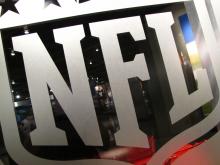
When Baltimore Ravens running back Ray Rice was suspended for only two games for beating his fiancée (now wife), it became a dramatic public example of the lack of accountability for professional athletes. Only when a video came out showing Rice punching his fiancée so hard it knocked her unconscious, and then dragging her limp body from the casino elevator, did the NFL take further action. As new incidents of domestic violence and child abuse come out, many are calling for Commissioner Roger Goodell to resign or lose his job.
But this epidemic is about so much more than Goodell, whose lack of leadership is typical in professional sports. It’s about more than one team, one league, or sports in general.
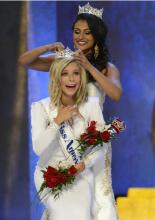
Sunday night, 23-year old Kira Kazantsev proved two things when she was crowned Miss America for 2015. First, she can make a nationally television audience “happy” by using only a red plastic cup. Second, domestic violence knows no bounds.
That’s right. This year’s Miss America is one of the every four women who has experienced domestic abuse in her lifetime. During college, Kazanstev was in an abusive relationship that left her “isolated” and “hopeless,” she recently told NPR. In the same interview, Kazanstev says she wasn’t aware of the resources available for victims of domestic violence: "I very well may have Googled it," she says. "But that's not the mindset that you're in when you're in that situation. You just feel alone. You feel helpless. You don't feel like anyone could possibly understand."

“Redskins.” The name of Washington, D.C.’s football team is a racial slur, a racist epithet. The U.S. trademark office agrees; so does the dictionary. But more importantly, Native American people feel it. How important is that to the rest of us? That is the moral question for all of us: are we going to show respect for our nation’s original citizens?
In an insightful column for the Chicago Tribune, Clarence Page compared NBA Commissioner Adam Silver’s decision to ban Clippers owner Donald Sterling “for life” for his private racist comments, with the decision yet to be made by the NFL and Washington’s owner to change a name deeply perceived as a public racist comment. “That’s the question at the heart in the name dispute. Who gets respect,” says Page.
Think about the name. Say it in your head or out loud in a private space. What comes to mind? Try to imagine why Native Americans feel the way they do.
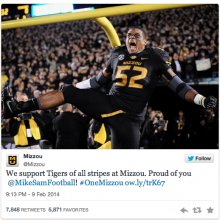
There’s something about Michael Sam that we are missing and I hope the church will see it.
Michael Sam is the college football star who “came out” in an interview with ESPN and the New York Times . He graduated in December and will be drafted in the upcoming NFL draft. Sam was the Southeastern Conference’s co-defensive player of the year and a first-team all-American. He came out to his teammates before the season started and at the end of the year they voted him their most valuable player.
But it’s not his superior football skills that the church should pay attention to. It’s his spirit and his sense of identity.
Throughout his interview on ESPN with Chris Connely, Sam smiles, clearly comfortable in his own skin. A few highlights of the conversation that are worth pointing out:
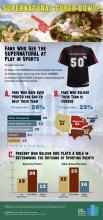
Most Americans don’t think God or the devil will be picking the NFL playoff winners this weekend or any other sports champions.
But some will pray nonetheless, and a few will “religiously” perform little game-day rituals just in case.
A survey by Public Religion Research Institute, released Thursday, probes the crossover between team spirit and spirituality.
Most Americans (60 percent) call themselves fans of a particular team. Among this group, several will do a little dance or say a little prayer to help the team along:
- 21 percent (including one in four football fans) will wear special clothes or do special rituals. Donning a team jersey leads the way (66 percent). But some admit they get a little funky with their underwear. One fan wears dirty undershorts on top of his jeans. (No word if these are boxers or briefs.)
- 25 percent (including 31 percent of football fans) have sometimes felt their team has been cursed. (No word on how many are Red Sox fans.)
- 26 percent (including one in three football fans) say they pray to God to help their team. White evangelicals are most likely to lean on the Lord on this: 38 percent will pray, more than any other religious group.
- Football fans are also more likely than other fans to admit praying for their team (33 percent to 21 percent), performing pre-game or game-time rituals (25 percent to 18 percent), or to believe that their team has been cursed (31 percent to 18 percent).
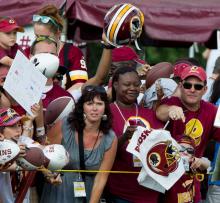
The Oneida Indian Nation’s campaign against the Washington pro football club’s team name picked up new supporters this week when more than two dozen clergy in the Washington region committed to taking the fight to their pulpits.
“Black clergy have been the conscience of America,” Oneida Nation representative Ray Halbritter said to a gathering of roughly 40 people on folding chairs in the basement of Plymouth Congregational United Church of Christ. “This is not a fight we could do by ourselves, or should do by ourselves.”
The Rev. Graylan Hagler, senior minister at Plymouth, asked for a show of hands Wednesday to indicate which clergy members in attendance would be willing to preach against what he termed the “R word.” More than a dozen raised their hands. Hagler said that a different dozen committed to the cause at a clergy breakfast meeting Wednesday and that, all told, he has commitments from roughly 100 clergy members to talk to their congregations in coming weeks.
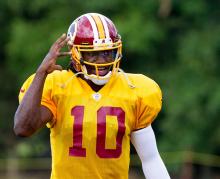
You know it is football season when the office starts grumbling about the offensive name of the local football team, or when co-workers start asking, "What ever happened to Tim Tebow?" Still others, "What is fantasy football?"
Politics aside, I went ahead and compiled a little fantasy team for Sojourners, featuring both prominent and less-prominent Christians thriving in the NFL. So if you own a fantasy football team, or are starting one for the first time, here are some picks to help inject some strong faith in your team. (I don’t get paid to do football analysis so take this for what it’s worth).
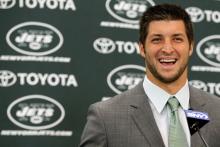
NEWARK, N.J. —Tim Tebow is Howdy Doody in a helmet. No, he is Opie Taylor running for touchdowns — while reciting Bible verses, stopping to find a lost dog, visiting sick children in a hospital and helping a little old lady across the street, all before he reaches the end zone.
Now that Tebow has been traded to the Jets, New Jersey is about to experience a dose of wholesomeness it hasn't seen since milk trucks stopped delivering to your door.
Tebow is the God-fearing, All-American evangelical hero — born to missionaries and delivered during a miraculous birth — who pledged his life to Jesus at 6 years old.
His priorities? "Faith, family, football." He has overcome obstacle after obstacle to become the most popular athlete in the nation's most popular sport, all while waging a personal battle against sin, temptation and the American way.
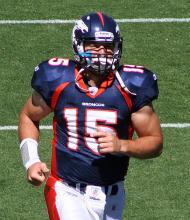
When asked why he’s so vocal about his beliefs, Tebow says, "If you're married, and you have a wife, and you really love your wife, is it good enough to only tell your wife that you love her on the day you get married? Or should you tell her every single day when you wake up and have the opportunity? That's how I feel about my relationship with Jesus Christ."
Wow, I can see why God would like him. And why fans of Cinderella stories would too. This season, as the Bronco's starting quarterback, Tebow has led his team to several dramatic victories, battling back from trailing scores in the last quarter. He’s a gifted athlete, and one who seems to be genuinely humble about it.